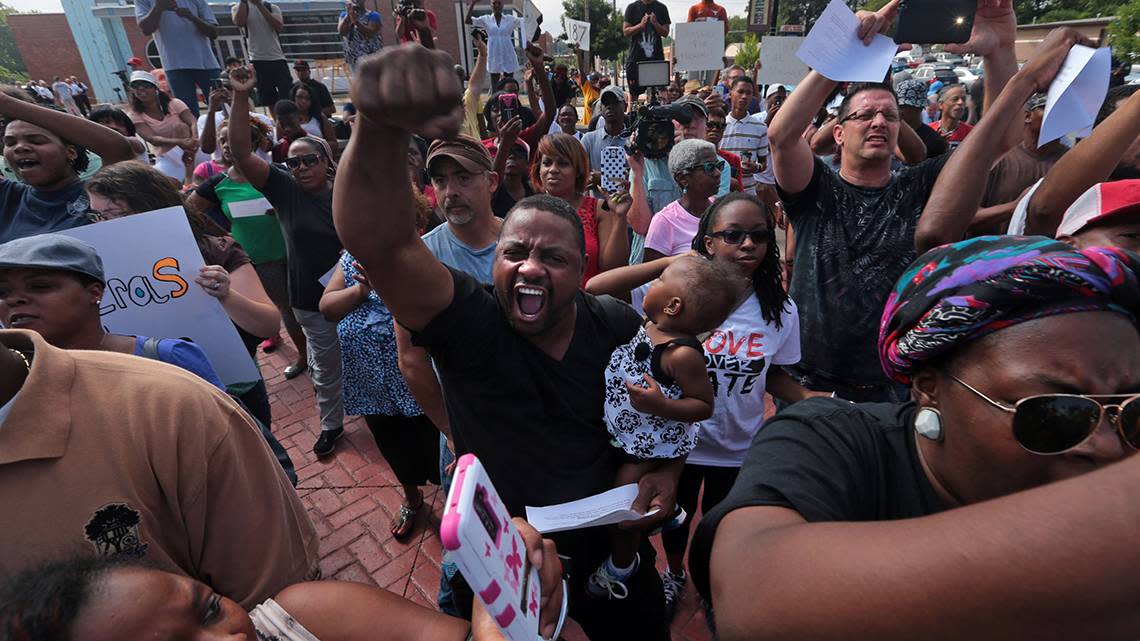As a Christian, I support Israel. As a Black man, I understand Palestine’s struggle | Opinion

I want to begin by reciting the well-worn quote that says, “Seek to understand rather than to be understood.” As a writer, I am challenged to remain true to lifting up marginalized voices. As a believer in Jesus, I will lift up the marginalized voice but end by lifting higher my “voice of choice.”
Over the last few weeks, I wanted to understand why so many Americans support the Palestinian movement. A quick response from a Harvard colleague stated, “When I see them, I see us” — African Americans — comparing the Palestinian struggle to the fight of the oppressed against police brutality and white supremacy in the United States.
How did he reach such a conclusion and conviction? On Aug. 9, 2014, Michael Brown was fatally shot by white police officer Darren Wilson in Ferguson, Missouri. Protests, both peaceful and violent, ensued, lasting for months at a time. Simultaneously, Israel was in the midst of Operation Protective Edge with the Hamas-ruled Gaza Strip. As protesters in Ferguson were being tear-gassed by the police, Palestinians in the West Bank and Gaza started tweeting at Ferguson protesters, advising them on how to insulate themselves from tear gas.
This ignited the From Ferguson to Palestine call to action that many activists continue to invoke today. Black Lives Matter, other lesser-known advocacy groups and Palestinian activists quickly began to use social media as a tool to express support for and solidarity with one another. This confluence of events created a collaboration and increased kinship between the two ideologies.
Those supporting the Black for Palestine effort believe that Black Americans and Palestinians are similar victims of repressive, armed and largely white colonialist governments. Both groups believe that their movements are perceived by outsiders as illegitimate, and share a narrative of dehumanization, oppression and resilience. The sense of shared experience has coalesced into an intentional coupling and conflating of their narratives.
Now, I am a firm believer that a person can understand a position without fully embracing it. Effective communication is the process of exchanging ideas, thoughts, opinions, knowledge and data so that the message is received and understood with clarity and purpose by the receiver. Once received and clearly understood, you should be provided an opportunity for exchange of ideas.
I want to take this opportunity to gently offer an alternative point of view. I still believe that people can disagree without becoming violently disagreeable.
Make no mistake: As a Christian Bible-affirming believer, I support Israel. My reasoning is based on my fundamental belief that the Bible is the final authority on all matters regarding faith and practice.
The word of God emphatically calls us to Psalm 122:6-8 which states: “Pray for the peace of Jerusalem: ‘May they prosper who love you. May peace be within your walls, And prosperity within your palaces.’ For the sake of my brothers and my friends, I will now say, ‘May peace be within you.’” From this command, I am convicted and convinced to support Israel.
I also believe that Israel has every right to defend itself. As one great commentator stated, war happens when language fails. It is clear no one wants to talk it out anymore. From the streets to the Senate, middle ground no longer exists. This is so sad.
Though I believe Israel should defend itself, I do not believe Israel has the right to vehemently wipe “evil” off the face of the planet. No created being has that right. That power belongs to Jesus who shall soon return in that region to establish lasting peace on Earth as it is in heaven.
In closing, I am often reminded of this sobering thought: Only the dead have seen the end of war. God help us.
Darron LaMonte Edwards is lead pastor of United Believers Community Church in Kansas City.

